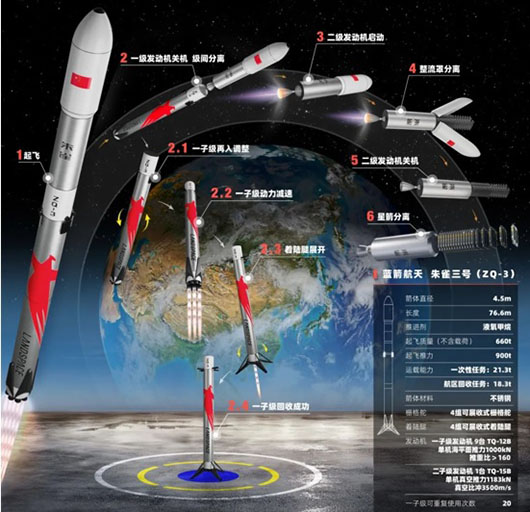Special to CosmicTribune.com, January 24, 2024
By Richard Fisher
In the burgeoning and cutthroat world of China’s “private” space launch sector, the motto of pioneering private company Landspace should be, “if you can’t beat them, join them.”
In 2016 this “private,” or not state-owned but still subservient to the Chinese Communist Party (CCP) company, Landspace, burst upon the International Astronautical Congress (IAC) meeting in Guadalajara, Mexico.

It brought an impressive floor display showing how it would be launching a modified version of the China Aerospace Science and Technology Corporation (CASC) Long March-11 solid fuel space launch vehicle (SLV).
In interviews with its leaders in Mexico, Landspace made clear it was ambitious, sure of an early launch schedule and hungry for foreign space launch business.
But at the 2017 Paris Airshow, a CASC official explained to this analyst that no, Landspace would not be making profits off of CASC technology; CASC would simply not be giving Landspace its solid fuel SLV technology.
Nevertheless, Landspace was likely able to advance a deal at some level with CASC to develop its Zhuque-1 solid fuel SLV, which performed one failed test launch on October 27, 2018.
But Landspace had to devise a new plan, and it decided to follow the lead of Elon Musk and his SpaceX corporation and develop efficient liquid-fueled SLVs based on an extremely reliable core engine that will support multiple launches for a single SLV.
On Jan. 19, Landspace made a major step toward this goal when it successfully tested a “hopper,” or vertical-launch-vertical-landing (VTVL) stage that will help develop its future Zhuque-3 reusable SLV.
That day, the “Zhuque-3 VTVL-1,” a 3.5 meter diameter test stage, launched, flew 60 seconds to an altitude of 350 meters, and then safely landed on its launch pad.
Full Text . . . . Current Edition . . . . Subscription Information

You must be logged in to post a comment Login